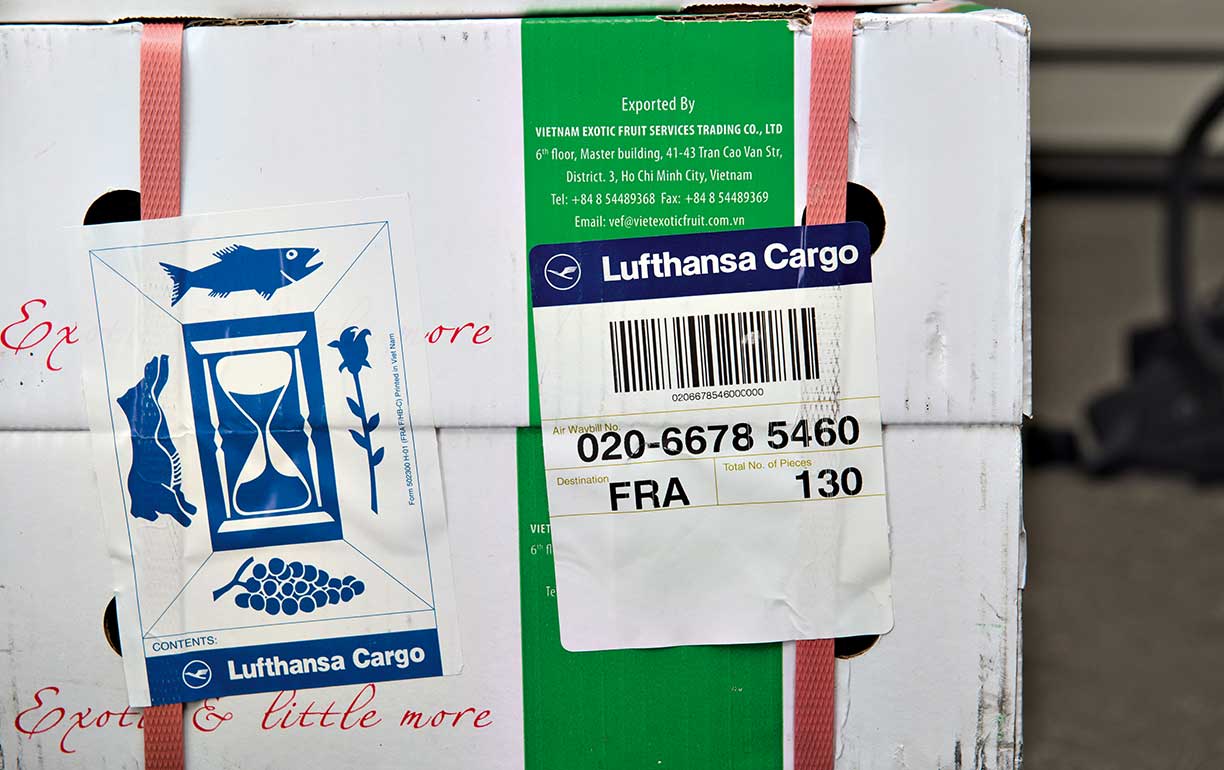
Flying fresh.
Dragon fruit from Vietnam, tree tomatoes from Colombia, limes from Brazil – the demand for exotic fruit and vegetables is constantly growing and they are now in season all year round. The fruit importer Inter from Hamburg and Lufthansa Cargo work together to ensure that the sensitive goods reach supermarkets, delicatessen stores and restaurant kitchens in top condition.
The asparagus on the pallet in a cold-storage room in Hamburg was harvested four days ago in a field in Peru. To ensure that it is fresh when it reaches the consumer, it needs to be transported from South America quickly. The journey begins in a refrigerated truck to the airport before continuing in a plane’s cargo hold across the Atlantic to Frankfurt.
Then it’s loaded back onto a truck to the city on the River Elbe. Transport from the country of origin has to meet strict requirements. Temperatures must be controlled and no compromises accepted when it comes to hygiene. For this reason, the company Internationale Fruchtimport Gesellschaft Weichert, Inter for short, uses the special product Fresh/td, which Lufthansa Cargo has developed for customers whose goods are very sensitive and thus have a limited shelf life.
Malte Storjohann also doesn’t take long to get from one climate zone to another. The importing company’s buyer and seller walks from the warehouse through a roller shutter door into the cold-storage room, checks the condition of the asparagus tips and smells the produce. Should the asparagus have the slightest imperfection, he would notice immediately. Colorful fruit from all over the world is stored in front of the white walls: avocados from Israel, for example, or red pitahayas from Venezuela, which gourmet chefs use to decorate desserts.
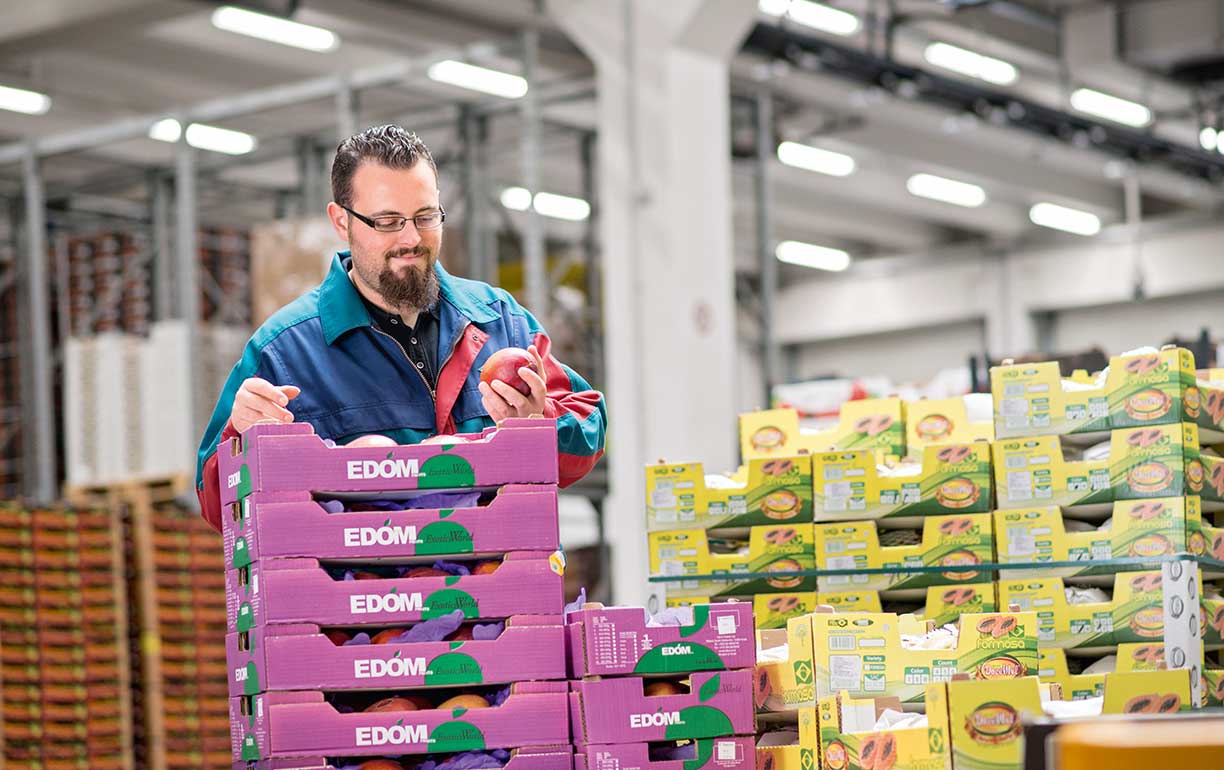
Malte Storjohann picks and chooses everything the customers could possibly desire and brings it to the halls of Hamburg’s central market. From there, the goods go to purchasers from Germany and Scandinavia, to retailers such as Edeka or Dansk Supermarked in Denmark, to wholesalers and to specialty stores. Inter began trading in fruit back in 1910. Today, 40 specialists work for the company. At Inter, Storjohann is responsible for the “exotic” items: for the types of fruit and vegetable that do not grow on the European continent.
The 29-year-old buys and markets fruit from Asia, Africa and South and North America. In addition to German and English, he also speaks Spanish and French, which facilitates communication with his suppliers. The aircraft is the means of transport of choice when importing perishable goods over long distances.
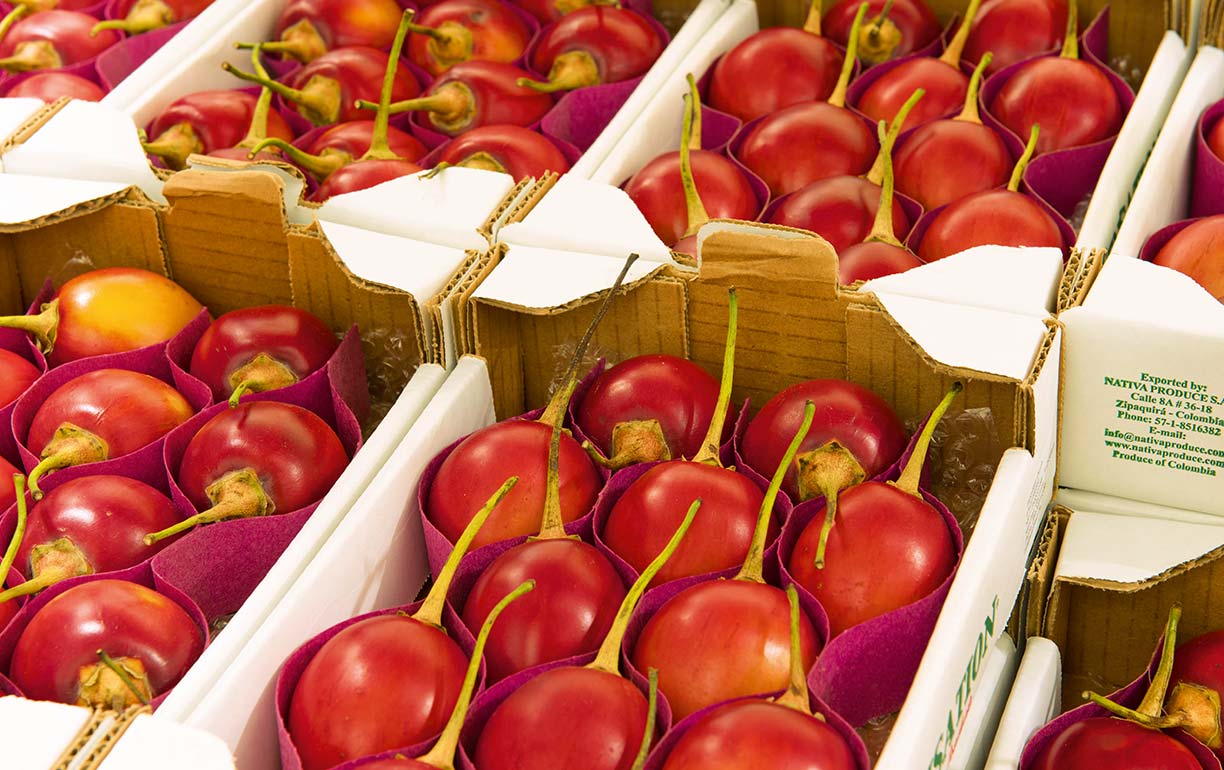
Around 700 to 800 metric tons of fruit and vegetables per year arrive for Inter at Frankfurt Airport, mostly flown in by Lufthansa Cargo. The importer uses Fresh/td with the add-on service To-Door. “With this product, Lufthansa Cargo offers us a carefree package,” says Storjohann.
Along with the airborne transport and the handling by specialist staff in Frankfurt, it also includes all truck transfers – right through to Inter’s warehouse in Hamburg. In addition, Lufthansa Cargo takes care of all the ‘paperwork’ including customs clearance.
Inter has over 100 types of fruit and vegetables in its product range. You won’t find apples or pears in the storage rooms in which the fork-lift trucks never seem to stand still. But you will find the grenadilla passion fruit from Colombia or the green soursop, which has a slightly acidic taste when ripe.
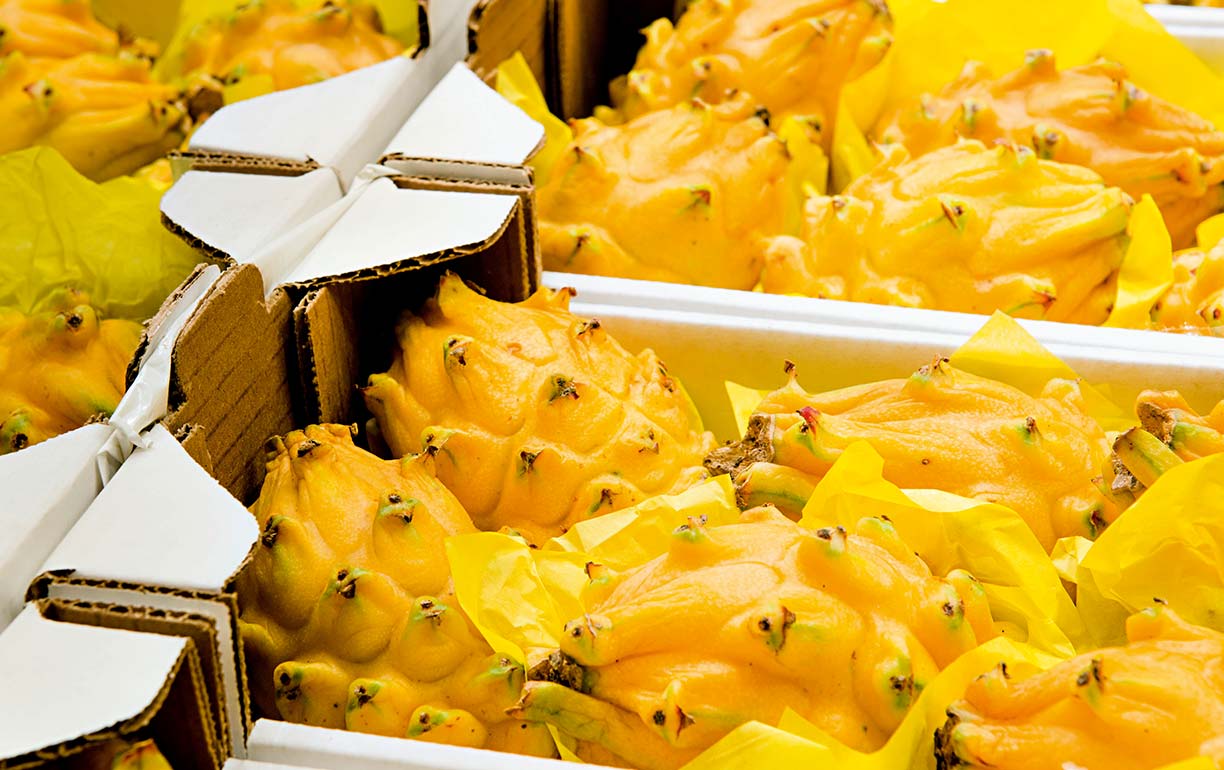
The demand situation has changed: “In the past, certain fruit was only eaten when it was in season. Today, the consumer wants the full range all year round,” explains Storjohann. This means that great care and perfectly coordinated supply chains are essential. The great effort on the part of those involved in this process has its price. For asparagus, for example, Inter requires reliable suppliers from South America, where the vegetable still goes on growing when the asparagus harvest in Europe is long over.
In such cases, a highly efficient logistics partner is even more crucial: “Lufthansa Cargo flies directly from Lima in Peru to Frankfurt. This is obviously a huge advantage for us.”
In an effort to minimize the impact of weather conditions on the ground, the goods are transported as quickly as possible from the aircraft to the Perishable Center Frankfurt (PCF), one of Europe’s biggest transshipment centers for perishable products. In addition to fruit and vegetables, the PCF also transships dairy products, fish and seafood, meat as well as flowers and plants. Various temperature zones ensure the right conditions to keep the products fresh. On an area of 9,000 square meters, there are 20 supervised zones in which the temperatures can be set at between minus 24 degrees and plus 24 degrees Celsius.
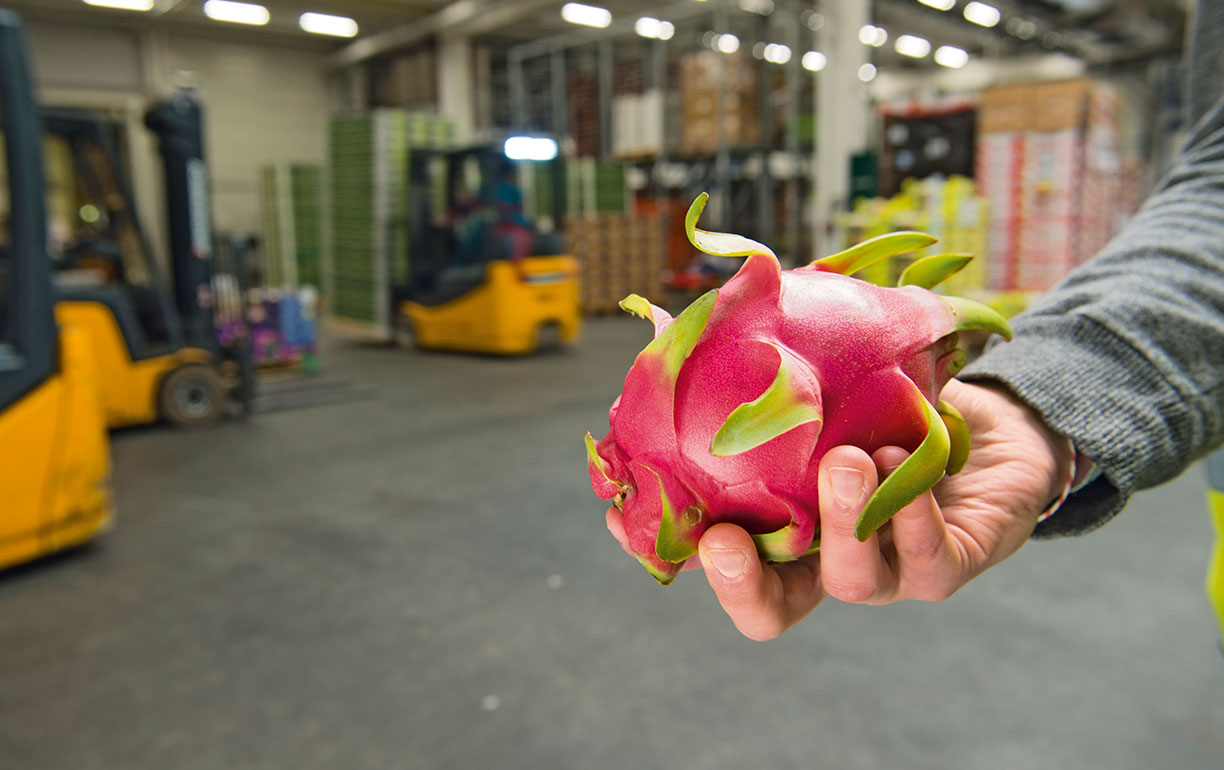
The asparagus from South America needs temperatures of just above freezing point. Airfreighted mangos flown in from Ivory Coast, Senegal or Peru stay fresh at higher temperatures. “The PCF is extremely useful. The people working there really know their job,” says Storjohann, who is a regular visitor to the center.
The goods are transported from Frankfurt by the freight forwarder Cool Chain Group, which operates on behalf of Lufthansa Cargo, to Inter’s warehouse in Hamburg. Lufthansa Cargo also uses state-of-the-art perishable centers similar to the one at Frankfurt Airport at its stations in Miami, Nairobi and Cairo.
The temperature on board the freighters or in the cargo holds of the passenger aircraft is also adapted to the respective requirements of the products. Experienced and trained personnel handle the goods. The entire chain of transportation is documented. Temperature checks are carried out on receiving the goods and during storage.
The shutter door to the Hamburg company’s next warehouse shoots up. Storjohann points to crates containing cocoa pods from South America: “Gourmets use them to make their own cocoa.” Pallets full of limes from Brazil stand a few meters further along, ready for delivery. Storjohann holds up a yellow dragon fruit to examine its quality. He goes down to the storage rooms several times a day. The goods have to be regularly checked. The dragon fruit from Ecuador has arrived in good condition.
Agriculture and food industry.
Flowers, fish, fruit, seeds and fertilizer have to reach their destinations quickly and undamaged. For a longer shelf life and a higher sales quota. Whether temperature-controlled or non-chilled, Lufthansa Cargo has been transporting such goods for numerous suppliers for years. The following solutions fulfill the particular requirements of the industry:
- uFresh/td – for perishable goods
- uCool/td – for temperature-sensitive goods
- uCare/td – for dangerous goods
- utd.Flash – for urgent shipments
- utd.Pro – for standard freight
Photos:
Christian Schmid
|
The shutter door to the Hamburg company’s next warehouse shoots up. Storjohann points to crates containing cocoa pods from South America: “Gourmets use them to make their own cocoa.” Pallets full of limes from Brazil stand a few meters further along, ready for delivery. Storjohann holds up a yellow dragon fruit to examine its quality. He goes down to the storage rooms several times a day. The goods have to be regularly checked. The dragon fruit from Ecuador has arrived in good condition. |
Agriculture and food industry. Flowers, fish, fruit, seeds and fertilizer have to reach their destinations quickly and undamaged. For a longer shelf life and a higher sales quota. Whether temperature-controlled or non-chilled, Lufthansa Cargo has been transporting such goods for numerous suppliers for years. The following solutions fulfill the particular requirements of the industry:
|
Photos:
Christian Schmid
